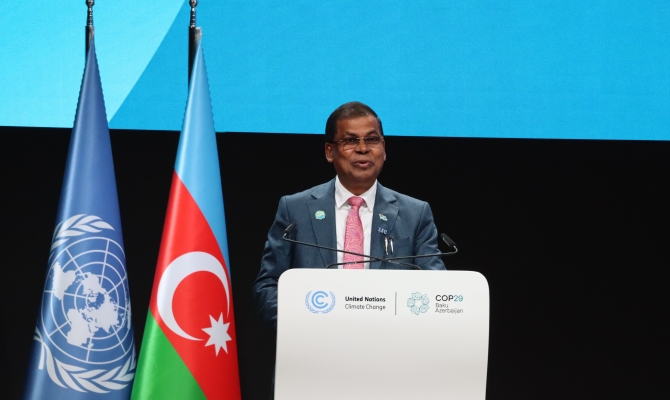The world needs US$1.3 trillion dollars to deliver 1.5 degrees.
The alternative is the burden of tens of trillions in loss, damage, and costs over the next decade in and an unstable and dangerous plus 3-degree world.
The message was delivered loud and clear by Biman Prasad, Fiji’s Deputy Prime Minister, when he addressed world leaders on Tuesday, during the High-Level segment of the 29th session of the Conference of the Parties to the United Nations Framework Convention on Climate Change (COP29) in Baku, Azerbaijan.
“The beauty here is the better scenario comes at a tenth of the cost. The reality of the situation is that US$1.3 trillion pales in the face of the US$7 trillion spent annually on fossil fuel subsidies – the money is there – it’s just in exactly the wrong place,” said Prasad.
“I hope leaders have the ability to spot a bargain, to understand a win-win when presented with it, and to recognise that the social, economic, environmental, and political costs of perpetuating fossil fuels far exceed the benefits.”
Fiji’s Deputy Prime Minister is amongst world leaders in Baku for COP29 calling for immediate steps to cut emissions to safeguard people from climate chaos. Fijians and Pacific communities are at the forefront of climate change impacts. The world cannot afford to ignore this.
Referring to the Paris Agreement, Deputy Prime Minister Prasad said the instrument stands not only to protect the most vulnerable but also to protect productivity, security, and shared prosperity.
“Without it – without solidarity – a much more difficult transition is required. The transition to protectionism, the transition away from multilateralism and the transition to every man and woman for his or herself world,” he said.
“Let me be clear –we need to raise the bar – lock in the basis for Paris and 1.5-degree aligned 2025 NDCs and secure an NCQG which is evidence-based and recognises the specific needs of SIDS and LDCs.”
Deputy Prime Minister Prasad is leading Fiji’s delegation who have joined Pacific leaders, Ministers and negotiators in Baku to advocate for the survival of their communities, who have been unfairly placed at the forefront of climate change impacts. Pacific countries remain adamant that the fight to keep global warming to 1.5°C above pre-industrial levels must be the priority in all efforts to advance global climate ambition at COP29.
This message was not lost on Fiji on climate change’s biggest global stage.
“Keeping global average temperature rise below 1.5 degree Celsius is not a loose policy slogan. It is not open to subjective interpretation. It is the science of survival, and it is the core of the multilateral effort we represent here,” said Prasad.
“With this in mind, the centrality of 1.5c degree target is unavoidable. The new collective quantified goal we must set here in Baku is a proxy for understanding whether the requisite commitment to achieving this target exists.
“If, here at COP29 we do not put in place the financial fundamentals for the transition that our 2025 NDCs must enable, the world will know unequivocally that despite years of effort we have lost sight of the horizon. The public will know that the current political storms and uncertain waters have beaten back our leadership at a time where reassurance and hope is needed more than ever. We cannot allow that.”
As Fiji’s Minister for Finance, Prasad said he neither has the appetite for bad maths, nor intent to accept creative accounting.
“Excellencies – we must deliver stability and deliver it now. The cost of carbon eclipses any semblance of credible economic rationale for keeping fossil fuels in play,” he said.
“Excellencies, all of our names and flags are on the record, and this record will not be forgotten – it will instead be analysed word for word by future generations whose reality you are determining and shaping today,” he said.














